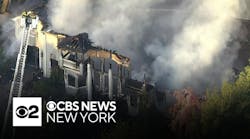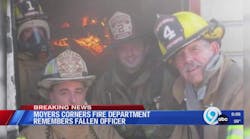In the latest in a string of recent blazes, firefighters spent several hours Sunday in nearly 100-degree temperatures battling a four-alarm fire that destroyed much of a Yakima storage facility.
Some 75 firefighters from across the Yakima Valley were called out for the fire, which started about 9 a.m. and quickly engulfed much of Bernd Moving Systems, a storage facility and partner of United Van Lines. The business is at 660 N. 18th Ave., at the corner of Jerome Avenue.
It took about two hours to bring the fire under control, but firefighters spent the rest of the day damping out hot spots and were expected to remain on the scene overnight. Investigators hope to get into the building early Monday to assess the damage and try to determine a cause. A very preliminary estimate placed losses at $1.5 million.
The 10,800-square-foot building contained about 200 individual storage units measuring 5 feet by 7 feet, said Dirk Bernd, son of company owners Doug and Karen Bernd, who were on vacation but came back to town Sunday afternoon after learning of the fire.
Most of the storage was household goods, which provided ample fuel for the fire.
"Our hearts go out to the families who lost personal belongings, memories and heirlooms as a result of the devastating events," the Bernd family said in a statement.
At the midmorning height of Sunday's containment efforts, firefighters were called in from seven fire departments stretching from Naches Heights to Toppenish. They brought with them 18 pieces of equipment, including ladder trucks that blasted water on the burning building from above.
"It's not uncommon to fight a fire like this for this long," said Deputy Chief Mark Soptich with the Yakima Fire Department. "Quite a bit of material inside the building, so it's just a lot of hard work.
The northern section of the building was constructed in the 1960s, and while it had an automatic alarm, it had no sprinkler system. The fire spread quickly through that section. But flames didn't spread to the newer southern third of the building, which is protected by a firewall.
That firewall helped "tremendously," Soptich said.
Access was the biggest issue for firefighters. Though they managed to tear a hole in an outer wall and open up roof vents early on, the fire continued to blaze through the jam-packed warehouse, burning hot and fast.
The exterior metal walls showed discoloration and appeared to buckle under the intense heat. The possibility of a roof collapse prevented firefighters from entering.
"The building is damaged to the point where it's not worth getting a firefighter hurt or killed for," Soptich said at the scene.
The turning point came when fire personnel brought in a backhoe from the city of Yakima's Public Works Department and tore floor-to-ceiling holes in two walls of the outer metal shell.
That allowed firefighters to put water directly on the source of the flames, as well as release some of the built-up heat from within the structure. That set off huge plumes of light gray smoke.
"Anytime that smoke turns white or gray, that's a good sign for us. That means we're getting water on the fire," he said.
None of it looked like a good sign to Pat Bernd, who found out about the fire at about 10 a.m. and was on scene with his wife and a few office workers.
"I was just shocked," he said. "It's just one of those things that you would never, ever see happening." He added that this is their busiest time of the year, because "everybody's relocating in the summer."
His parents got back into town about 4 p.m. Sunday. The building is insured, and they plan to rebuild on the same spot, but will probably seek a temporary facility nearby in the meantime.
"The biggest loss here is it's people's household goods," Bernd said. "Our plan is to treat this like someone's home that had burned down: We're going to recover as much as we can and have it set aside so those people can go through it."
They plan to contact each of their customers within the next two days and people can come down to the office with questions, he said.
Fortunately, even within the two-thirds of the building that burned, Bernd said there are vaults that were spared by the fire, and only sustained smoke and water damage. The storage vaults in the newer third of the building didn't appear to be damaged.
Firefighting efforts were made more difficult by Sunday's temperatures, which were well above 90 degrees by 11 a.m. Firefighters' heavy suits can absorb water, and when wet can weigh more than 60 pounds.
"You have to be careful not to over-exert yourself, keep hydrated and take frequent breaks," said Lt. David Stark, who's been with the Yakima Fire Department for almost 16 years. "Just this time of year it's really difficult. ... The heat is a big factor."
All the stored goods in the building just added to that heat, he said.
"It makes it harder to get access, and can also make a structure fail faster."
The building was unoccupied, and the only injury was a firefighter who suffered a second-degree steam burn on his wrist, Soptich said.
Sunday's blaze was at least the fourth major fire in the Upper Yakima Valley in recent days. On Saturday, a barn was destroyed and a nearby home was badly damaged during a fire in the 2200 block of South 67th Avenue. On Friday, fire crews kept an apartment fire in the 1400 block of Folsom Avenue from spreading to adjacent apartments, but damage was still pegged at about $30,000.
That fire was blamed on an electrical short. On Wednesday, a pasture fire spread to a West Valley home in the 11000 block of Tieton Drive. The home was heavily damaged, but no injuries were reported. The fires are not considered connected.
Firefighters are also watching rangelands, where grass is quickly drying under the August sun.
Worried Kittitas County authorities imposed a fire ban in much of that county last week.
Sunday's fire is a hard blow, but the Bernds say they're holding up fairly well.
"It's like a death in the family -- you're so busy making other arrangements, finding security contractors, insurance agents ... but it is sad," Bernd said."This is just something that (my parents) would never fathom."
McClatchy-Tribune News Service





